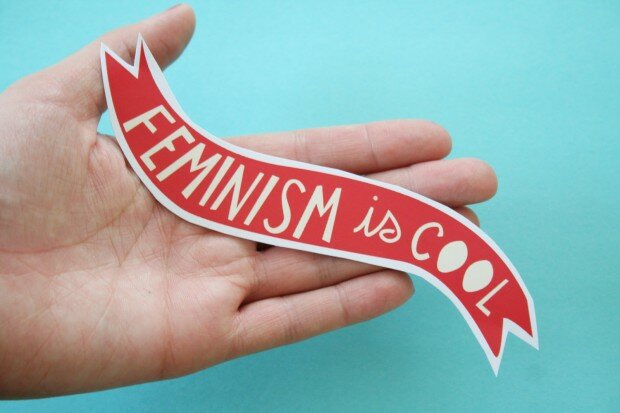“A feminist believes that everyone – EVERYONE – should have the same rights regardless of gender.”
That is the definition of feminism as phrased by Katy Burnett, the President of the Gainesville-area NOW – National Organization for Women, the largest organization of feminist activists in the United States.
“It is a pretty basic idea,” she writes.
 Via: 212 Access
Via: 212 Access
Unfortunately, as simple as the concept is, it doesn’t seem to be coming across to society so easily. It’s so far from being understood that Time magazine originally included “feminist” in a poll titled “Which word should be banned in 2015?” Editors have since apologized for the slight, claiming that the original intention had been to “invite debate about some ways the word was used this year.”
So, let’s discuss this.
Why has the movement become such a taboo, to the point where the term “feminazi” was created to describe activists, and even women celebrities (Katy Perry, Kelly Clarkson, and Shailene Woodley to name a few) have declared themselves not to be feminists, even though they support gender equality? According to Burnett, you can’t have one without the other, and those who claim otherwise “are just uneducated about the real issues and the definition of the word ‘feminist.’”
What’s the definition that has been going around, then?
 Via: Womens Health Magazine
Via: Womens Health Magazine
Take a look at Shailene Woodley: in her interview with Time magazine earlier this year, she claimed she doesn’t consider herself a feminist because she doesn’t agree with the “raise women to power, take the men away from the power” approach. She thinks it “would never work out because you need balance.” And right there, we see a crucial misunderstanding. Feminism is about gender equality, not female supremacy. Feminism is about that very balance – the movement advocates against the supremacy of either gender, it just so happens that a patriarchal societal structure has been set up through history, so that is the structure being challenged for its lack of balance.
Does challenging the patriarchy make you a man-hater? Burnett replies with another question: “Is it fair to call civil rights leaders ‘white-haters’?” The Civil Rights movement is about equality and so is feminism. “It has nothing to do with man-hating at all. I honestly know many feminist men and I know a lot of moms who are raising fine feminist boys.”
Furthermore, Burnett raises an interesting point: “The truth about feminism is that its biggest obstacle are women – women who refuse to challenge the status quo. Women keep other women down as much as men do and keep the patriarchy going. Women have to learn to stick up for their own self-interests.” Really?
Yes, really. Because here is the thing about the status quo: it is comfortable for a lot of women. According to Burnett, “some women are uncomfortable with the idea that they have the same rights as everybody else. Equality can be very intimidating.”
 Via: Billboard
Via: Billboard
For instance, here is why Kelly Clarkson doesn’t see herself as a feminist: “I love that I’m being taken care of, and I have a man that’s an actual leader.”
Equality can seem daunting and undesirable to those who fit nicely in the system, but what should be made clear is that feminists are not fighting to extinguish this lifestyle. Feminists are not fighting to save women from their current roles. Feminists are fighting against the obligation and inevitability of those roles, so that women who are not comfortable in them will have the right to choose something else if they so desire.
But let’s say Time had its way – let’s say misconceptions won out against the true meaning of feminism, and the word was banned in 2015. What is synonymous with that idea? How else could we phrase the same ideas? Burnett answered this question as well: “Human rights is a pretty good other name if I had to choose – because that is basically what women are fighting for.” She’s pretty good with ‘feminist’ movement, though.
 Via: Chicago Now
Via: Chicago Now
Bottom line is this: there is a misconception that in order for feminists to win, men have to lose. Sorry, guys, but true feminists are not after your jobs or your rights to be men or whatever else you’re thinking. True feminists just want equality for all people, not just women.
So next time you want to chastise someone for being a feminist, think about what the word actually means.
Feature photo courtesy of: Liz Boltz Ranfeld





